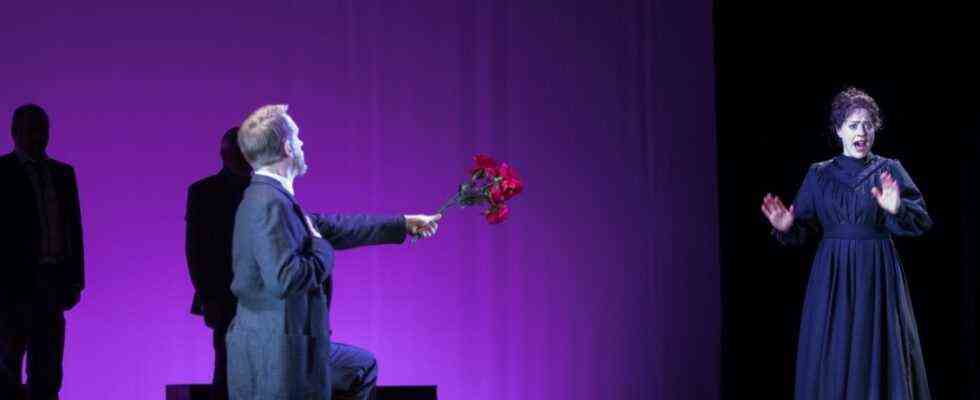He is a great scientist and a charming man – a little clumsy, but driven by noble ideals. Beyond material interests, he propagates the spirit of progress that should benefit everyone: “These discoveries belong to the world”, says Pierre Curie (Johannes Schön) once, and his wife (Anja Klawun) looks up to him in love at this moment : Marie Curie’s eyes sparkle tenderly and there is pride in her gaze.
The ingenious woman who has achieved groundbreaking achievements in the field of radioactivity, who (with Pierre’s help) discovered the chemical elements radium and polonium, is often anything but a delicate person. Grown small, but spiritually big and fired by a strong will that makes them strive uncompromisingly for independence and knowledge. “Gentle is a disgusting word. I never spared myself,” she says harshly at the beginning of the evening to the nurse Elise Allard, who adores Curie and wants to study medicine because of her.
Susanne Felicitas Wolf’s play “Marie Curie”, which was premiered on Thursday evening in the Unterföhringer Bürgerhaus, begins with a scenario that shows the brilliant scientist in an uncomfortable situation. Anja Klawun (Curie), dressed in a black and gray dress, is in a clinic, she has to undergo an eye operation. Because the long occupation with radium and other radiation phenomena attacked your eyes. She, who was born Maria Skłodowska in Warsaw in 1867, as a young woman left Poland, which was then part of Russia, to study at the Sorbonne in Paris; She, who with her husband Pierre and Henry Becquerel received the Nobel Prize in Physics in 1903 and the Nobel Prize in Chemistry in 1911, the first female professor at a French university. She cannot move around here independently, is afraid of losing control. “I hate putting myself in the hands of others,” she says. And then this nurse also annoys with her unabashed admiration (“You are a guiding star”), especially since she expresses herself unhappy to the Curie who wears a white bandage around her eyes: “We read your every wish from your eyes.”
In the staging by director Thomas Luft, the clinic scene is the starting point for a summary and review of the life of the Curie. Klawun and Amelie Heiler, who plays the nurse, stand on slightly inclined stage platforms, while other actors such as Johannes Schön and Eva Wittenzeller, Andreas Joachim Hertel and Reinhold Behling, who appear as biographical companions, sit in the background. “It was important for us not to simply work through the stages in life, but to find a dramaturgical framework,” explains the director.
In fact, there is no strict chronological sequence – the scandalous relationship with the married physicist Paul Langevin that Marie Curie had years after the death of her husband – he got caught in a horse-drawn cart in 1906 – is discussed about early that evening. In front of a red illuminated background, the players mimic the public riot as angry silhouettes and symbolize the attacks of the conservative press against Curie, who was insulted as a native Polish “foreigner” who wants to take her husband away from a French woman.
Nevertheless, the staging means are not always thrilling. It turns out to be difficult to put science and its development under the circumstances of the time, combined with outstanding biographical chapters, in adequately gripping scenes and images.
The acting is good, especially Johannes Schön is engaging as Pierre Curie, and Heiler is convincing as a hyper-excited nurse. Wittenzeller’s portrayal of the American journalist Missy Meloney is also impressive. Klawun has by far the most text, which sometimes also contains more complex scientific explanations – she solves that well. Her dialogues as a grumbling patient with a healer are also successful, and the young Polish schoolgirl is taken from her, who as a patriot can only keep herself in check – later she will name Polonium after her homeland. With Schön, she has intimate, moving moments. All in all, however, due to the somewhat fragmented appearances of the characters, there is little that is deeply moving on the stage. More speed, more crackling dialogues would have done the production good. Some text passages are also declamatory and a bit dry.
The lighting design is convincing, there are also some pretty choreographies – and the idea of simulating Marie Curie’s tension in the clinic (“noise in the ear”) with a temporary, annoying noise is slightly uncomfortable, but that’s what it should be . It is generally about the tension between “love and radium”. About life, love, and the obsessive role science played in it. And also about the accompanying social circumstances with which Curie, a pioneer of her gender, was confronted. As a figurehead of the women’s movement, however, she is not portrayed: “I am not a feminist. I am a person who performs and searches for light.”
You get closer to the ingenious, unconventional personality, who was always on the trail of the light of knowledge, and who remained a combative idealist despite all the difficult nature and increasingly careless appearance, on this premiere evening in Unterföhring. There is also a current reference in accentuating the importance of science, which embodies the spirit of progress. “Never give up, dignity, inner attitude” – these are Curie’s maxims. Nothing can be said against this, but the staging could have used more momentum and suggestive power.

